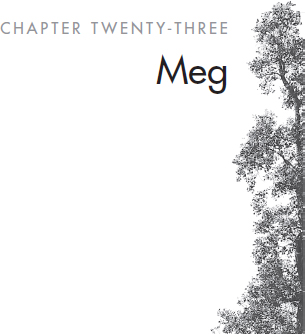We didn’t eat the vegetables. Rosemary and I pulled them all up out of the soil, forked and raked the roots and bulbs, and fed them to the fish. Then we turned the earth all over on itself and left the rain to rinse it through. Not that there’d be rain for a while, but we would wait. It was the least we could do.
‘There’s a lot of water’s come down that hill,’ Eddie said. Meaning maybe only a capful came through the dead girl. You’ve had tomatoes on your plates already, and what you didn’t know then didn’t hurt you. But even Nathan Carney dammed his river higher than he set the cemetery, and we’d planted right beside Tom and Leonie’s caravan, which stood on the rectangle of cement that marked the spot my own had been. The one that was pushed by land that left the track I’d followed all the way to what was left of Jessie Else.
It didn’t seem right for us to eat the vegetables.
Eddie watched us wheel the shoots and tangled roots away and shook his head, but he didn’t make a fuss. More seeds, more shovelling and tending, nothing he would have to do, and nothing at all really anyway compared to the body itself, and the fact that it had been there with us all along.
They must have driven down Shank Lane and pulled into our clearing and dragged her little body up into the dark. Had it been dark? I hadn’t heard them (hadn’t stopped them). Who knew when they’d come? They might have had her for weeks or months. They might have brought her with them still alive, bound and gagged and unimaginably afraid.
‘She’ll have been dead already,’ Eddie said. But she might not have been. They might have killed her right there where I found her, in among the sweet grasses and moss, though there would have been more brush than bed back then; the year had yet to tear it open. I wondered would they have walked her up, or carried her slung over one shoulder like a sack of coal?
‘No,’ Rosemary said. Just no.
More likely they’d killed her somewhere else, somewhere they knew better, stuffed her into that sack by handfuls like a sleeping bag, brought her out to dump her and then driven home to a wife, perhaps—to a life, anyway.
The police came—great hordes of them, in fluorescent vests, and with dogs, and they walked a slow line up the hill looking for any tiny thing that didn’t belong.
Then came the journalists and officers in plain clothes and in pairs this time, like Starsky and Hutch, and they came inside our houses and asked a lot more questions than they had the year before.
Did I put my cat out at night?
At about what time did I do that (if I did it) and what time did I go to bed, as a rule?
Was I a churchgoer?
Did I have a boyfriend (had I ever had a boyfriend)?
Did I have a drink ever at all (one, two or three)?
They were more experienced, Catherine said, and they needed to be because after more than a year of nothing, suddenly here was something. Here was everything.
The journalists parked their vans as close as they were able and drank tea from plastic cups while they waited for something to happen, but the body was long gone, taken carefully and quietly before too many people knew it had been found.
The story was all over the radio and in the papers, and Catherine said it was all over the television too. Helicopter vision and ‘just a lot of dust flying’, she said, but there was more than dust in the air.
I was the Local who’d ‘discovered the remains’. The Courier used a photograph they’d taken in the library after the flood to print beside a letter I’d sent to the editor, thanking everyone for all the help and kind notes they’d sent me. This time they printed Lily’s picture too (an angry face too slow to pull a curtain), and Eddie and Rosemary’s wedding portrait. But the words they chose began to change the flavour until it was something bitter and too-sticky that was being stirred in the pot.
The police took Eddie away for further questioning, wanting answers too big for a kitchen table. They’d bring him back when they were finished with him, they told Rosemary. Not ‘when he’s answered all our questions’. Not ‘when he’s helped us with our inquiries’. When we’ve finished with him, as if he was yesterday’s paper. But they called him Mr Lamb and Sir and held the car door open while he climbed in like a family friend, so we were not alarmed.
I was relieved when they dropped him home later that same afternoon, but I knew they hadn’t finished with him, because for all its Secret Santas, Winifred was still a meat-and-potatoes town, and Eddie living in Magpie Beach (where there were few magpies and there was no beach) with a wife not the full Aussie made, neighbours not all there, or a bit-of-a-handful; people were going to talk, and two and two can make a lot more than four given enough pointing fingers.
